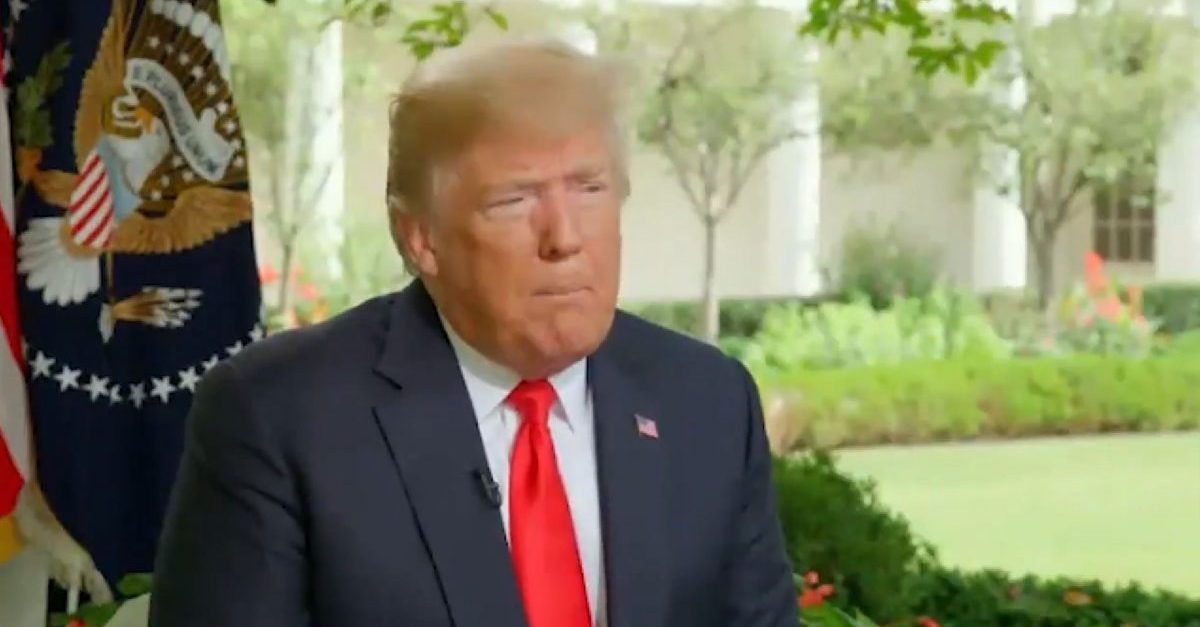
President Donald Trump, by way of a late-morning tweet on Tuesday, not-so-subtly suggested that the National Broadcasting Company (NBC) have their broadcast license revoked. Could that actually happen? Almost certainly not.
First, here are the president’s full comments in context.
NBC FAKE NEWS, which is under intense scrutiny over their killing the Harvey Weinstein story, is now fumbling around making excuses for their probably highly unethical conduct. I have long criticized NBC and their journalistic standards-worse than even CNN. Look at their license?
— Donald J. Trump (@realDonaldTrump) September 4, 2018
Trump’s suggestion for an inquiry and his complaint appear to be based around NBC’s “unethical conduct” viz. the Ronan Farrow–Harvey Weinstein situation. Farrow and others claim that NBC killed a blockbuster expose into Weinstein’s alleged history of sexual assault in order to curry favor with the one-time Hollywood kingmaker. Would NBC’s decision be enough to sustain a challenge to their broadcast licenses? Probably not.
In the United States, broadcasters are regulated by the Federal Communications Commission (FCC) under the agency’s internal rules and guidelines as well as the strictures of the originating legislation, the Federal Communications Act. So, any official inquiry would need to begin at the FCC itself as a matter of basic procedure. By way of FCC grants, NBC holds over a dozen licenses for NBC stations–mostly owned-and-operated by local affiliates. (The parent company, NBCUniversal, holds many more such grants for other properties under their banner, like Telemundo.) Such licenses are renewed for eight-year terms, maximum.
During the renewal process, the FCC looks into whether the licensee in question has served the public interest. As part of this inquiry, FCC chairs look at whether any major violations of the Federal Communications Act or internal FCC rules have occurred and whether any other allegedly untoward behavior might support the finding that the licensee has exhibited a consistent pattern of abuse. Such findings are rare.
The FCC has been in existence for some 84 years and during this time period very few license revocations have actually occurred. So, it would take something particularly egregious for NBC to have their licenses taken out from underneath them. Like what?
As Law&Crime’s Ronn Blitzer noted in a previous analysis:
[T]here was WLBT, the Mississippi TV station…that lost their license after black viewers complained that the station was only showing white people’s attitudes towards desegregation in the wake of the 1954 Brown v. Board of Education Supreme Court decision.
The FCC has also ruled that non-broadcast activity could warrant a license revocation if it’s “so egregious as to shock the conscience and evoke almost universal disapprobation.” Michael Rice fit the bill when he was convicted of sexually assaulting five children. He lost seven radio licenses after that.
NBC’s alleged behavior here–declining to run a thoroughly vetted story based on non-news considerations doesn’t quite track with one-sided and racist coverage of a major Civil Rights issue. Maybe this argument would hold some water if it could be shown that NBC fully ignored the #MeToo movement–but that just didn’t happen and NBC has subsequently reported on the Weinstein story as well. As for the Rice situation–there’s no genuinely arguable parallels here. Whatever NBC’s original motivation to can the Weinstein story, no one at NBCUniversal is accused of such shocking and indefensible crimes.
Furthermore, FCC Chairman Aji Pai has made it clear that his agency cannot revoke broadcast licenses based on content of a particular newscast. To support this position, Pai made reference to the First Amendment itself. He said:
[The FCC] I believe in the First Amendment. The FCC under my leadership will stand for the First Amendment. And under the law, the FCC does not have the authority to revoke a license of a broadcast station based on the content of a particular newscast.
Keeping in line with that position, the government punishing a broadcaster because they refused to report on a certain story in a certain way and at a certain time would likely be interpreted as a form of compelled speech. Under First Amendment jurisprudence such speech is not permissible.
NBC should rest easy. Their licenses aren’t going anywhere over the Farrow-Weinstein imbroglio.
[image via screengrab/Fox News]